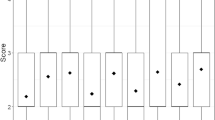Abstract
Objective: The objective of this study was to develop a revision of the Symptoms of Stress Inventory (SOSI), the Calgary SOSI (C-SOSI), which would be shorter, easier to administer and score, and have excellent factor structure, reliability, and validity for use with oncology patients. Methods: The SOSI was administered to 344 cancer patients registered for a stress-management program. Exploratory factor analysis (EFA) was applied using three criteria based on communality, factor loading, and desired subscale size. Scores on the revised C-SOSI were correlated with scores on measures of quality of life, mood disturbance, sleep, and spirituality to begin investigation of convergent and discriminant validity. Results: The EFA resulted in a 56-item scale (down from the original 94 items) with 8 subscales, each consisting of 6–9 items named: Depression, Anger, Muscle Tension, Cardiopulmonary Arousal, Sympathetic Arousal, Neurological/GI, Cognitive Disorganization, and Upper Respiratory Symptoms. Cronbach’s alpha reliabilities for the subscales ranged from 0.80 to 0.95. Convergent and discriminant validity was supported by correlations with other measures as conceptually predicted. Conclusions: The C-SOSI is a reliable tool with converging validity for assessing stress symptoms in an oncology population. Further validation work is recommended to support use in other patient or community groups.
Similar content being viewed by others
References
Aaronson, N. K., Ahmedzai, S., Bergman, B., Bullinger, M., Cull, A., Duez, N. J. et al. (1993). The European organization for research and treatment of cancer QLQ-C30: A quality-of- life instrument for use in international clinical trials in oncology.Journal of the National Cancer Institute, 85, 365- 376.
Brodman, K., Erdman, A. J., & Wolff, H. G. (1947).Cornell Medical Index Health Questionnaire. New York: Cornell University Medical College.
Buysse, D. J., Reynolds, C. F., Monk, T. H., & Berman, S. R. (1989). The Pittsburgh Sleep Quality Index: A new instrument for psychiatric practice and research.Psychiatry Research, 28, 193- 213.
Carlson, L. E., & Garland, S. N. (2005). Impact of mindfulness- based stress reduction (MBSR) on sleep, mood, stress and fatigue symptoms in cancer outpatients.International Journal of Behavioral Medicine, 12, 278–285.
Carlson, L. E., Speca, M., Patel, K. D., & Goodey, E. (2003). Mindfulness-based stress reduction in relation to quality of life, mood, symptoms of stress, and immune parameters in breast and prostate cancer outpatients.Psychosomatic Medicine, 65, 571–581.
Carlson, L. E., Speca, M., Patel, K. D., & Goodey, E. (2004). Mindfulness-based stress reduction in relation to quality of life, mood, symptoms of stress and levels of cortisol, dehydroepiandrostrone-sulftate (DHEAS) and melatonin in breast and prostate cancer outpatients.Psychoneuroendocrinol- ogy, 29,448–474.
Carlson, L. E., Ursuliak, Z., Goodey, E., Angen, M., & Speca, M. (2001). The effects of a mindfulness meditation based stress reduction program on mood and symptoms of stress in cancer outpatients: Six month follow-up.Supportive Care in Cancer, 9, 112–123.
Cohen, S., Kamarck,T., & Mermelstein, R. (1983). A global measure of perceived stress.Journal of Health and Social Behavior, 24, 385–396.
Colton, T. (1974).Statistics in medicine (1st ed.). Boston: Little, Brown.
Derogatis, L. (1980).The Derogatis stress profile. Baltimore, MD: Clinical Psychometric Research.
Fink, G. (2000).Encyclopedia of stress. San Diego: Academic Press.
Garland, S. N., Carlson, L. E., Cook, S., Lansdell, L., & Speca, M. (2007). A non-randomized comparison of mindfulness-based stress reduction and healing arts programs for facilitating post- traumatic growth and spirituality in cancer outpatients.Journal of Supportive Care in Cancer, 15, 949–961.
Holmes, T. H., & Rahe, R. (1967). The social readjustment rating scale.Journal of Psychosomatic Research, 11, 213- 218.
Kabat-Zinn, J. (1990).Full catastrophe living: Using the wisdom of your body and mind to face stress, pain and illness. New York: Delacourt.
Leckie, M. S., & Thompson, E. (1979).Symptoms of stress inventory. Seattle WA: University of Washington.
McNair, D. A., Lorr, M., & Droppelman, L. F. (1971).Profile of mood states. San Diego: Educational and Industrial Testing Service.
Peterman, A. H., Fitchett, G., Brady, M. J., Hernandez, L., & Cella, D. (2002). Measuring spiritual well-being in people with cancer: the functional assessment of chronic illness therapy- Spiritual Well-being Scale (FACIT-Sp).Annals of Behavioral Medicine, 24, 49–58.
Speca, M., Carlson, L. E., Goodey, E., & Angen, M. (2000). A randomized, wait-list controlled clinical trial: The effect of a mindfulness meditation-based stress reduction program on mood and symptoms of stress in cancer outpatients.Psychosomatic Medicine, 62, 613–622.
Thompson, E. A. (1989).Interpretation of the symptoms of stress inventory. Seattle, WA: Department of Psychosocial and Community Health; University of Washington.
Zalaquett, P., & Wood, J. (1998).Evaluating stress: A book of resources. Lanham, MD: Scarecrow Press.
Author information
Authors and Affiliations
Corresponding author
Additional information
Linda E. Carlson conceived of the need for this study and a shortened tool, coordinated the data collection and data tabulation, and drafted the manuscript introduction and discussion sections. Bejoy Cherian Thomas participated in the design of the study, designed the methodology, performed the statistical analysis, and drafted the manuscript Methods and Results sections. All authors read and approved the final manuscript.
Dr. Linda E. Carlson is supported by a New Investigator Award from the Canadian Institutes of Health Research. Dr. Bejoy Thomas is supported by a Canadian Institutes of Health Research (CIHR) research allowance and operating grants from the Canadian Breast Cancer Research Alliance (CBCRA) awarded to Dr. Carlson.
Rights and permissions
About this article
Cite this article
Carlson, L.E., Thomas, B.C. Development of the calgary symptoms of stress inventory (c-sosi). Int. J. Behav. Med. 14, 249–256 (2007). https://doi.org/10.1007/BF03003000
Issue Date:
DOI: https://doi.org/10.1007/BF03003000




